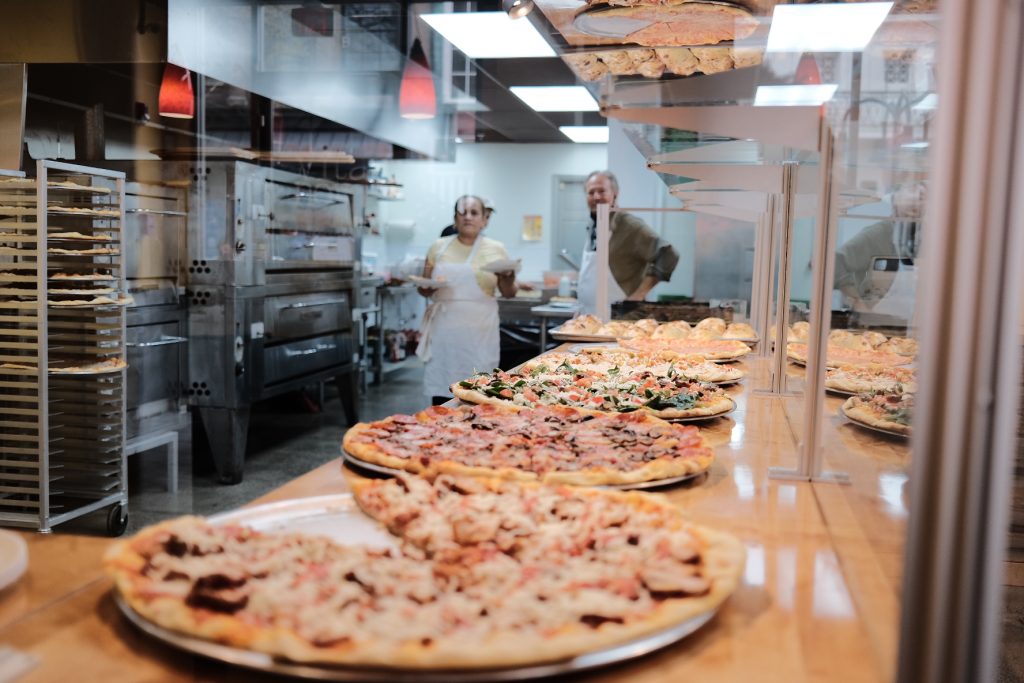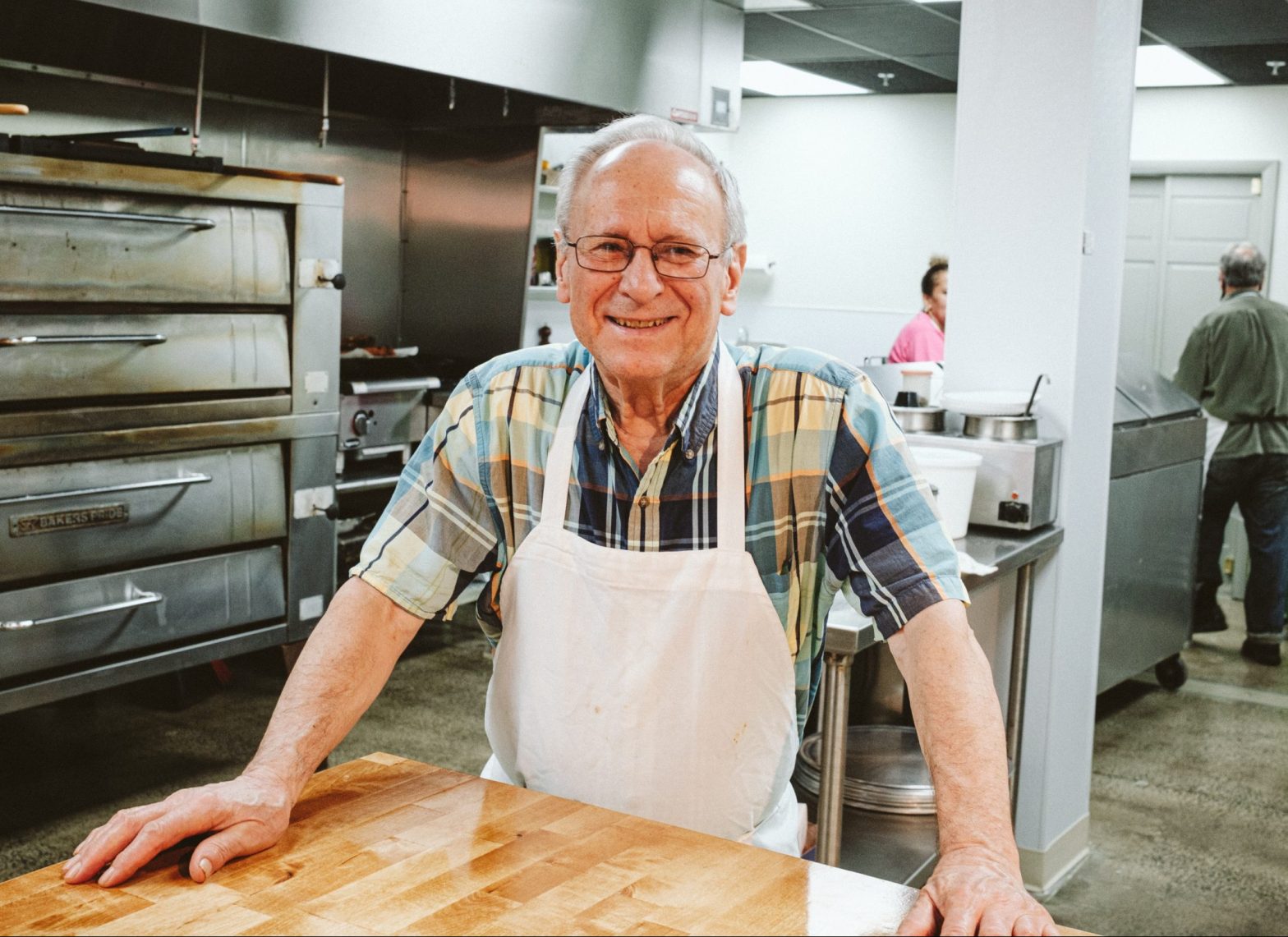“Fresh mozzarella, tomato, and basil—that is the perfect pizza!”
Giovanni Sestito, owner of Vita Nova Pizza and Pasta Bar, sings the praises of the Caprese’s toppings. “When you look at it, it’s lively, it’s inviting. It’s flavorful, but it’s simple,” he says. Thanks to that compelling combo, the Caprese has remained a staple on Sestito’s menu throughout the years. “That never goes away,” says Sestito. “That stays.”
The same could be said for Vita Nova. The pizza joint has been serving slices, calzones, pasta, salads, and tiramisu on the Downtown Mall for the past 25 years—more than half of the pedestrian mall’s entire existence. Now, due to building renovations, the restaurant has moved for the first time, directly across the mall to a bright corner location with a stylish interior.
Sestito is a quiet and unassuming man, an Italian immigrant in his 70s, devoted to pizza, but also a math major who speaks four languages. He says Dante’s La Vita Nuova inspired the name of his restaurant (it means “new life” in Latin). The name was significant in other ways too—when he opened Vita Nova, Sestito was embarking on a new life, as a recent arrival to the United States.

Sestito was 11 in 1954, when his family emigrated from Calabria, Italy, to San Juan, Argentina, joining a wave of Italians seeking better opportunities in South America post-World War II. Sestito grew up in Argentina, and made a living teaching math. Then, in the early 1980s, he won a scholarship to study at the University of Waterloo in Canada, where he earned a master’s degree in math. From Canada, Sestito followed his two brothers to the United States.
In Massachusetts, his career moved in a new direction, and with the help of his brother, Sestito opened his first restaurant. When his brother moved south, Sestito did too, and arrived in Charlottesville in 1997. He bought Sylvia’s Pizza on the Downtown Mall, and changed the name to Vita Nova in 2006.
How does a math major learn to run a pizza place? “By reading and the force of stubbornness,” laughs Sestito. He quickly became a pizza nerd who’s not afraid to do his research—he once called the General Mills hotline to get the nitty-gritty on a certain kind of flour.
Other things, however, you learn on the job, such as the quirks of the American palate. “One of my first experiences running the store,” Sestito remembers, “this guy came in and said, ‘I want a pizza with everything.’” To Sestito, this was ridiculous. “I told him, ‘We have 72 toppings. Are you sure you want everything?’”
“In Italy, they don’t expect more than two or three toppings on their pizza,” he says. Beyond the harmony of flavors, this ensures the dough rises properly in the oven, without getting too weighed down. But try telling Americans that.
Another early lesson came while working on the Downtown Mall during Fridays After Five. “It was surreal,” says Sestito. “There were double lines, for two, three, four hours. It was nonstop!”
As hectic as it was, he misses those days. “The Downtown Mall was the heart of the city,” he says. What he sees today isn’t the same. “The people on the Downtown Mall need support. The backbone of the American economy is small business, but they have been the hardest hit by the pandemic and online shopping.”
For Sestito, the key is thinking globally and shopping locally. “A small store on the Downtown Mall pays taxes to the city,” explains Sestito, so if you want your city to thrive, “you have to spend your money where you live.”
The pizzamaker experienced the power of community during the pandemic. With his lunch crowds disappearing due to online work, he seriously considered shutting down. But longtime Vita Nova customers were not about to let that happen. Sestito was astounded by the outpouring of support. “So many people asked me to stay,” he says. “And to stay on the mall, not anywhere else. That expression of solidarity really makes you rethink, so I decided to give this another chance.”
He’s grateful he stayed open, though it was not without hardships. Vito Nova went from a staff of seven employees to just two, and Sestito had to make the unexpected move to its new location. A typical week for him involves going into the shop every day, often working from 8 in the morning to 10 at night.
But pizzamaking is something he loves. He waxes poetic on the finer points of pizza toppings, and gets a dreamy look in his eye when weighing in on the thin-crust/thick-crust debate. What’s more, the business feels like family. Luis, the guy most likely ringing you up at Vita Nova, has worked with Sestito for 29 years.
When asked about his plans for the future, Sestito laughs. “My father didn’t retire till he was 85, so I still have a few years in me,” he says, as he gestures fondly to the new space. “I plan on being here for a while.”

